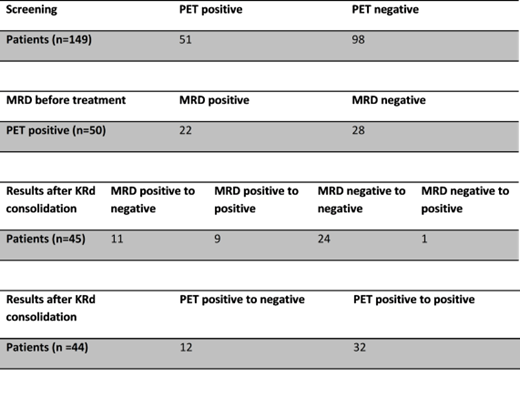Abstract
Background:
[18F]-Fluorodeoxyglucose positron emission tomography/computed tomography (FDG PET/CT) positivity after first line treatment with autologous stem cell transplantation (ASCT), is strongly correlated with reduced progression free survival and overall survival (Moreau et al., JCO, 2017). However, FDG PET/CT positive patients who obtain FDG PET/CT negativity after treatment seem to have comparable outcomes to patients who were FDG PET/CT negative at baseline (Davies et al., Haematologica 2018). Aiming for FDG PET/CT negativity may therefore be an important goal in myeloma treatment. The use of FDG PET/CT positivity as an indication for consolidation therapy after ASCT has not been studied before.
Methods:
This is an ongoing, multicenter phase II study. Patients with multiple myeloma who have received standard first line treatment including ASCT and achieved very good partial response (VGPR) or better, are eligible for the study and examined by FDG PET/CT. Patients who are FDG PET/CT positive defined by the Italian Myeloma criteria for PET USe (IMPETUS) (Nanni C et al., EJNMMI 2016 and 2018) are included in the treatment phase of the study and are assessed for minimal residual disease (MRD) by Euroflow (sensitivity: 10 -5) before treatment. FDG PET/CT examinations are centrally read by two experienced nuclear medicine radiologists. The treatment consists of four 28-day cycles of KRd (carfilzomib 36 mg/m 2 day 1,2,8,9,15 and 16 (except 20 mg/m 2 day 1 and 2 first cycle), lenalidomide 25 mg day 1-21 all cycles and dexamethasone 40 mg day 1,8,15 and 22 all cycles). After 4 cycles, FDG PET/CT and Euroflow for MRD are repeated for response evaluation. Both patients with FDG PET/CT negativity and patients with FDG PET/CT positivity at baseline are followed for progression free survival and overall survival.
Results:
As of the 1st of July 2021, 149 patients have been screened in the study. Fifty-one patients (34%) had a positive FDG PET/CT post-ASCT. Twenty-eight of 50 (56%) patients with positive FDG PET/CT were MRD negative. Forty-four patients have completed four cycles of KRd consolidation; Twelve (27%) patients converted into FDG PET/CT negativity. Nine of them were MRD negative both before and after consolidation; two were MRD positive both before and after consolidation and one turned MRD negative after consolidation. In all patients who were FDG-PET positive before treatment, the rate of MRD negativity after consolidation treatment was 78%. Eleven of twenty (55%) patients who were MRD positive before consolidation treatment turned MRD negative after treatment.
Conclusion:
A significant proportion (34%) of patients treated with standard first line treatment including ASCT with achieved very good partial response or better was FDG PET/CT positive post-ASCT. Fifty-six percent of them were MRD negative by Euroflow, confirming the complementary features of these two methods. Treatment with four cycles of KRd converted 12 of 44 (27%) patients to FDG PET/CT negativity, and 78% of all patients were MRD negative after treatment. The study is ongoing and we will follow up on data for progression free (PFS) and overall survival (OS). At the congress, complete post-consolidation data for all patients (n=50) will be presented.
Nørgaard: Bayer: Honoraria; AstraZeneca: Honoraria; Ultimovacs: Current holder of individual stocks in a privately-held company; Targovax: Current holder of individual stocks in a privately-held company; Photocure: Current holder of individual stocks in a privately-held company. Tsykunova: Sobi: Consultancy; Ablynx: Consultancy; Janssen: Consultancy, Honoraria, Research Funding; Amgen: Consultancy, Honoraria; Sanofi: Consultancy. João: Janssen: Consultancy; Amgen: Consultancy, Membership on an entity's Board of Directors or advisory committees; BMS: Consultancy, Membership on an entity's Board of Directors or advisory committees; GSK: Membership on an entity's Board of Directors or advisory committees; Gilead: Membership on an entity's Board of Directors or advisory committees, Research Funding; Takeda: Consultancy, Research Funding. Schjesvold: Takeda: Honoraria, Membership on an entity's Board of Directors or advisory committees; GSK: Research Funding; Nordics Nanovector: Current holder of individual stocks in a privately-held company; Sanofi: Consultancy, Honoraria, Research Funding; Oncopeptides: Consultancy, Current holder of individual stocks in a privately-held company, Honoraria, Research Funding; Janssen: Consultancy, Honoraria, Research Funding; Celgene/BMS: Consultancy, Honoraria, Research Funding; SkyliteDX: Honoraria; AbbVie: Honoraria; Bayer: Consultancy; Adaptive Biotechnologies: Consultancy; Schain: Honoraria; Amgen: Consultancy, Honoraria, Research Funding; Novartis: Consultancy, Honoraria.


This feature is available to Subscribers Only
Sign In or Create an Account Close Modal